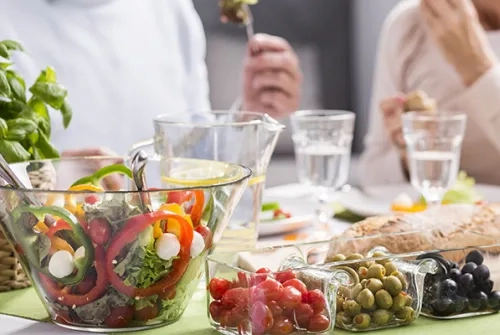Alo Yeditepe
Alo Yeditepe
10 Tips for Diet on Religious Holidays
The month of Ramadan has ended. Now it is time to return to routine eating habits. However, shortly after this period in which nutrition is kept to a minimum and organs are rested, starting to overeat with the Ramadan Feast will both tire the body out and cause you to gain weight.
To avoid this, a smooth transition is best. Each individual will apply what is best for himself/herself in the diet that varies according to the person. But some habits are considered almost healing for everyone. Yeditepe University Kozyatağı Hospital Dietician and Phytotherapy Specialist Buket Ertaş listed the points to be considered during the Ramadan Feast.
Increase your fluid consumption;
Fluid consumption may be insufficient during Ramadan. We need sufficient water consumption for all our organs, especially the kidneys, to function properly. In addition to being healthy, it is necessary to pay attention to water if you have weight problems or edema problems. It is almost impossible for a dehydrated body to get rid of edema. Taking most of the extracellular accumulated and edema-causing water into the cell will improve our health. At the same time, if you are experiencing attacks of overeating, drinking water will contribute to your feeling of satiety. Because sometimes the mechanisms of hunger and thirst feel the same. It should come to your mind that you may be thirsty when you are constantly eating and do not feel satiety. Diuretic drinks such as coffee and tea (causing a fluid loss) increase the need for water even more. Therefore, water consumption should not be neglected along with other liquids.
Do not have breakfast without protein;
The foods that stay in the stomach the longest are the foods with high protein content. Starting the day with a sufficient amount of protein is an important key to starting the day energetically as well as prolonging your satiety time. For example, high-quality protein sources for breakfast are omelets with lots of greens or vegetables, and eggs scrambled with tomatoes and green pepper that will both keep your satiety time long and reduce your desire to eat carbohydrates to a minimum.
Do not skip meals;
It is a little more difficult to recover the blood glucose that drops after long fasts. In order to solve its hunger, the body turns to simple carbohydrates that raise blood glucose quickly. It is important to eat on time so that the balance is not disturbed, and our brake mechanism is activated. Eating the meal on time and not skipping it will help you make the right choice. Although snacks provide instant satiety, they actually make you hungry again in the long run. Try to eat meals on time and, if possible, prefer home-cooked meals.
If you have had a late breakfast, you can update your meal times;
Holidays would be a typical example of a Sunday. Generally, it starts with a late and rich breakfast, and the day ends with dinner. Actually, this order is not a bad choice. If it does not pose a problem for your health and does not disrupt your medication regimen, sometimes 2 meals can be preferred. However, keeping the interval between meals too long can cause you to become very hungry again and to eat more than necessary in the evening. For this reason, after a late and quality breakfast, it is useful to have a small intermediate meal in order not to be too hungry at dinner. Fruit, nuts, tzatziki, kefir, and maybe a small toast are some examples of quality intermediate meals.
Take the consumption of the sweets you crave to early hours;
Metabolism works even faster during active times. High-calorie foods consumed during a particularly active time of the day are easier to burn. Although the calories taken do not change, it is more reasonable when the profit and loss calculation is made. In addition, frequency is very important. Everyday escapade can cause harm to your health if it becomes a routine. Therefore, it is useful to reduce the frequency to a minimum and try not to eat it every day.
Do not forget to eat vegetables;
Vegetables naturally contain plenty of fiber, vitamins, and minerals. They have a positive effect on the entire digestive system and their calories are lower than other food groups. Constipation is common, especially during Ramadan. It is useful to keep plenty of vegetables in our lives to contribute to the routine of the intestinal system. In addition, thanks to its abundant fiber content, both our stomach and eyes will be satisfied. In this way, the craving for sweets and pastries will also decrease. You can contribute to your health by promising yourself 1 meal of herbal nutrition during the festive periods when pastry and meat consumption are intense.
Use grilling and baking instead of frying;
Using too much oil and frying in a way that causes the oil to burn can sometimes make even very healthy foods unhealthy. Food both loses its nutritional value and increases its calorie content. Even frying the onion while cooking a classic vegetable dish is actually one of the things that should not be done. If we enter the kitchen with the awareness of this, both nutritiousness will be at the forefront and unnecessary calorie intake will not be made.
Do not forget to exercise;
If conditions allow, brisk walking at the end of the day or the beginning of the day helps to balance your daily calories and protect your cardiovascular health. For those who have weight problems, if their blood glucose does not decrease, walking on an empty stomach in the morning before starting the day will also accelerate fat burning.
Soups should be homemade and cream-free;
One of the unnoticed calories is soups. While homemade soups with plenty of vegetables, if possible, will help both digestion and increase satiety, soups made with cream or with the addition of plenty of flour will not provide satiety and will cause you to gain weight.
It will be safer to choose a milky dessert or ice cream instead of dough and fried desserts;
As we just mentioned, sometimes the cooking method is vital. The calories of fried desserts also increase exponentially. Milky dessert should be our first choice, both in terms of calcium support and because it has fewer calories.
3-DAY SAMPLE DIET LIST
DAY 1
BREAKFAST
- 1 egg scrambled with pepper, parsley, and plenty of tomatoes
- 1 slice of sourdough bread
- 1 slice of white cheese
- Seasonal vegetables
- 2 walnut kernels
- Green tea
LUNCH
- Spicy baked zucchini and eggplant (in the oven)
- 1 bowl of tzatziki or yogurt
- 4 tablespoons of bulgur pilaf
INTERMEDIATE MEAL
- 1 portion of milky dessert OR 1 portion of fruit
DINNER
- Homemade grilled meatballs
- 1 bowl of green salad with apple cider vinegar
- Half portion of bulgur pilaf
- 1 glass of ayran
DAY 2
BRUNCH
- Low-fat omelet with 2 eggs and plenty of greens
- 3 tablespoons of curd cheese
- 1 slice of brown bread
- 4 olives
- 1 teaspoon of honey
- 2 halves of walnut kernels
- Lots of seasonal vegetables (cold cuts)
Note: 1 portion of fruit can be added instead of honey.
AFTERNOON INTERMEDIATE MEAL
- 1 glass of plain kefir, 1 teaspoon of crushed linseed
- You can choose half a portion of fruit (you can make a smoothie through a blender) or a dessert you like.
DINNER
- Mixed grill or fish grill
- Oily green beans
- 1 bowl of soft apple cider vinegar salad with mixed ingredients
- 1 slice of brown bread
DAY 3
BREAKFAST
- Toast with string cheese, red pepper, and olives
- 1 bowl of mixed green salad
- 2 walnut kernels
- 1 cup of green tea
LUNCH
- Mixed vegetable soup with marrowbone broth added
- 1 bowl of spicy yogurt or tzatziki
DINNER
- Oven-baked eggplants with minced meat
- Bulgur pilaf
- 1 bowl of tzatziki
- Optional salad
This content was prepared by Yeditepe University Hospitals Medical Editorial Board.
”
See Also
- What is Vitamin A? What are the benefits of Vitamin A?
- What is Selenium? What Does It Do? What are the Benefits?
- Does the Sweltering Heat Affect Our Mental Health?
- What is Vitamin E?
- What is Coenzyme Q₁₀? What are the Benefits of Coenzyme Q₁₀?
- What is Vitamin B12? What are the Symptoms of B12 Deficiency?
- What is Mythomania (Pathological Lying Disorder)? What Causes Mythomania?
- What is Emotional Hunger? How Does It Arise?
- Benefits of Spices
- What Does Narcissist Mean? Narcissistic Personality Disorder
- At What Age Should Children Start Using Social Media?
- What is the Ideal Age for Marriage?
- Special Nutrition Recommendations for the Eid
- The True Face of the Protein Myth
- What Are the Benefits of Beets?
- Suggestions to Get Rid of the Menopause Belly
- Swallowable Gastric Balloon
- "Is the Watermelon Diet Healthy?
- Ways to Boost Mental Resilience
- Frequently Asked Questions about Detox
- Boost Your Immunity Naturally
- Which Foods Should be Consumed Together?
- How Do You Approach a Child Who Is Reluctant to Go to School?
- Stop Blaming Yourself
- The Concern of Being a ‘’Good Mother’’ in Pregnancy
- It is Possible to Lose Weight by Dominating Your Brain
- Mom, Can I Sleep With You?
- 9 Points to Be Considered for a Healthy Ramadan Month!
- Emotional Eating May Be the Cause of Your Weight Gain
- The Healthiest Summer Fruits
- Shining Star of the Tables: Probiotics
- The Problem may be the Lack of Self-Confidence!
- Ways to Deal with Quarantine Weight
- Burnout Syndrome at Work Gains Weight
- Children Should Be Away From Fast Food Toy
- Children's Eating While Studying Prepares the Ground for Obesity
- Permeable Bowel Syndrome Can Prepare the Ground for Diseases
- 6 Ways to Spend New Year's Eve Without Gaining Weight
- Suggestions to Prevent Children from Gaining Weight While Still
- 8 Suggestions to Keep the Immune System Strong in Ramadan
- 8 Suggestions for Kids with Focus Problems
- It is also Possible to Lose Weight During the Holidays!
- Summer Recipes
- Immune Enhancing Nutrients
- 8 Mistakes That Make Weight Loss Harder
- Is Co-Sleeping With the Child Right?
- Healthy New Year's Eve Table Suggestions
- Do not take unneeded calories to your body
- You May Have Leptin Resistance Below Your Constant Desire To Eat!
- Foods That Increase Blood Sugar
- The Nutritional Principle of the Feast of Sacrifice Should Be Balance
- Suggestions to Increase Metabolic Rate…
- Nutrition Recommendations Before the Exam
- How to Feed Children in Summer?
- Is There a Nutritional Difference Between Sports to Increase BMI and Sports to Lose Weight?
- What Should You Do to Avoid Gaining Weight for the Holidays? Do Not Be a Victim of the Buffet
- Cancer and Nutrition
- Nutrition and Diet
- 5-Day Recovery Diet After the Religious Holidays
- 5 Rules You Should Follow When Eating Desserts
- Healthy Diet
- Elderly Care
- Alkaline Nutrition
- 9 Tips to Prevent You from Gaining Weight While at Home
- 9 Suggestions to Fix Childrens Deteriorated Eating Habits
- Fibromyalgia May Be the Cause of Persistent Pain
- What to do from Iftar to Sahur for a Healthy Ramadan
- 9 Tips for Proper Nutrition During Pregnancy
- Constant Feeling of Hunger Might Actually be Hiding Some Diseases!
Alo Yeditepe



